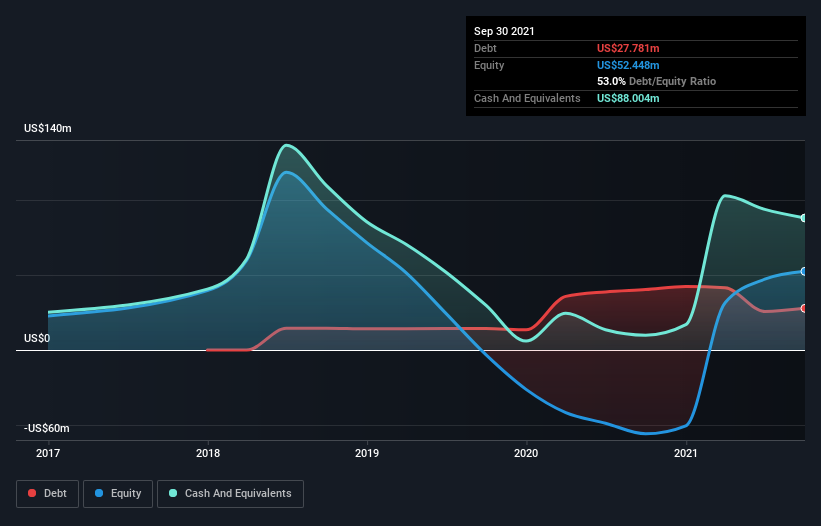Is Iterum Therapeutics (NASDAQ:ITRM) Weighed On By Its Debt Load?
The external fund manager backed by Berkshire Hathaway's Charlie Munger, Li Lu, makes no bones about it when he says 'The biggest investment risk is not the volatility of prices, but whether you will suffer a permanent loss of capital.' It's only natural to consider a company's balance sheet when you examine how risky it is, since debt is often involved when a business collapses. We can see that Iterum Therapeutics plc (NASDAQ:ITRM) does use debt in its business. But the real question is whether this debt is making the company risky.
What Risk Does Debt Bring?
Debt assists a business until the business has trouble paying it off, either with new capital or with free cash flow. In the worst case scenario, a company can go bankrupt if it cannot pay its creditors. However, a more usual (but still expensive) situation is where a company must dilute shareholders at a cheap share price simply to get debt under control. Having said that, the most common situation is where a company manages its debt reasonably well - and to its own advantage. When we examine debt levels, we first consider both cash and debt levels, together.
See our latest analysis for Iterum Therapeutics
How Much Debt Does Iterum Therapeutics Carry?
You can click the graphic below for the historical numbers, but it shows that Iterum Therapeutics had US$27.8m of debt in September 2021, down from US$40.3m, one year before. However, its balance sheet shows it holds US$88.0m in cash, so it actually has US$60.2m net cash.
How Strong Is Iterum Therapeutics' Balance Sheet?
Zooming in on the latest balance sheet data, we can see that Iterum Therapeutics had liabilities of US$17.8m due within 12 months and liabilities of US$28.1m due beyond that. Offsetting these obligations, it had cash of US$88.0m as well as receivables valued at US$1.03m due within 12 months. So it can boast US$43.1m more liquid assets than total liabilities.
This excess liquidity is a great indication that Iterum Therapeutics' balance sheet is almost as strong as Fort Knox. With this in mind one could posit that its balance sheet means the company is able to handle some adversity. Succinctly put, Iterum Therapeutics boasts net cash, so it's fair to say it does not have a heavy debt load! There's no doubt that we learn most about debt from the balance sheet. But it is future earnings, more than anything, that will determine Iterum Therapeutics's ability to maintain a healthy balance sheet going forward. So if you're focused on the future you can check out this free report showing analyst profit forecasts.
It seems likely shareholders hope that Iterum Therapeutics can significantly advance the business plan before too long, because it doesn't have any significant revenue at the moment.
So How Risky Is Iterum Therapeutics?
Statistically speaking companies that lose money are riskier than those that make money. And we do note that Iterum Therapeutics had an earnings before interest and tax (EBIT) loss, over the last year. Indeed, in that time it burnt through US$22m of cash and made a loss of US$99m. With only US$60.2m on the balance sheet, it would appear that its going to need to raise capital again soon. Even though its balance sheet seems sufficiently liquid, debt always makes us a little nervous if a company doesn't produce free cash flow regularly. The balance sheet is clearly the area to focus on when you are analysing debt. However, not all investment risk resides within the balance sheet - far from it. To that end, you should learn about the 5 warning signs we've spotted with Iterum Therapeutics (including 2 which shouldn't be ignored) .
If, after all that, you're more interested in a fast growing company with a rock-solid balance sheet, then check out our list of net cash growth stocks without delay.
Have feedback on this article? Concerned about the content? Get in touch with us directly. Alternatively, email editorial-team (at) simplywallst.com.
This article by Simply Wall St is general in nature. We provide commentary based on historical data and analyst forecasts only using an unbiased methodology and our articles are not intended to be financial advice. It does not constitute a recommendation to buy or sell any stock, and does not take account of your objectives, or your financial situation. We aim to bring you long-term focused analysis driven by fundamental data. Note that our analysis may not factor in the latest price-sensitive company announcements or qualitative material. Simply Wall St has no position in any stocks mentioned.

 Yahoo Finance
Yahoo Finance 
